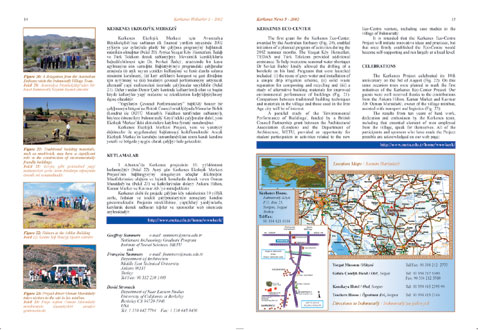KERKENES ECO-CENTER
The
first grant for the Kerkenes Eco-Center, awarded by the Australian
Embassy (Fig. 20), enabled
initiation of a planned program of activities during the 2002
summer months. The Yozgat Köy Hizmetleri, TEDAS and Türk
Telekom provided additional assistance. To help overcome seasonal
water shortages Dr Sevket Bagci kindly allowed the drilling
of a borehole on his land. Programs that were launched included:
(i) the reuse of grey-water and installation of a simple drip
irrigation scheme, (ii) solid waste separation for composting
and recycling and (iii) a study of alternative building materials
for improved environmental performance of buildings (Fig.
21). Comparison between traditional building techniques
and materials in the village and those used in the Iron Age
city will be of interest.
A
parallel study of the 'Environmental Performance of Buildings',
funded by a British Council Partnership grant between the Architectural
Association (London) and the Department of Architecture, METU,
provided an opportunity for student participation in activities
related to the new Eco-Centre venture, including case studies
in the village of Sahmuratli.
It
is intended that the Kerkenes Eco-Centre Project will initiate
innovative ideas and practices, but that once firmly established
the Eco-Centre would become self-supporting and run largely
at a local level.
CELEBRATIONS
The
Kerkenes Project celebrated its 10th anniversary on the 3rd
of August (Fig. 22).
On this same occasion trees were planted to mark the first initiatives
of the Kerkenes Eco-Center Project. Our guests were well received
thanks to the contributions from the Ankara Hilton, Kamar Market
and Kavmar AS. Osman Muratdagi, owner of the village minibus,
assisted with transport and logistics (Fig.
23).
The
results from ten years of hard work, dedication and enthusiasm
by the Kerkenes team, including that essential element of men
employed from the village, speak for themselves.



